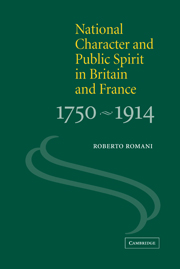Book contents
- Frontmatter
- Contents
- Acknowledgements
- List of abbreviations
- Introduction
- Part I 1750–1850
- 1 All Montesquieu's sons: the place of esprit général, caractère national, and mœurs in French political philosophy, 1748–1789
- 2 After the Revolution: Staël on political morality
- 3 From republicanism to industrialism and national character: Melchiorre Gioja, Charles Dupin, and Continental political economy, 1800–1848
- 4 The French Restoration dispute over mores and Tocqueville
- 5 Between Whiggism and the science of manners: Britain, 1750–1800
- 6 British views on Irish national character, 1800–1846
- Part II 1850–1914
- Conclusion
- Index
2 - After the Revolution: Staël on political morality
Published online by Cambridge University Press: 22 September 2009
- Frontmatter
- Contents
- Acknowledgements
- List of abbreviations
- Introduction
- Part I 1750–1850
- 1 All Montesquieu's sons: the place of esprit général, caractère national, and mœurs in French political philosophy, 1748–1789
- 2 After the Revolution: Staël on political morality
- 3 From republicanism to industrialism and national character: Melchiorre Gioja, Charles Dupin, and Continental political economy, 1800–1848
- 4 The French Restoration dispute over mores and Tocqueville
- 5 Between Whiggism and the science of manners: Britain, 1750–1800
- 6 British views on Irish national character, 1800–1846
- Part II 1850–1914
- Conclusion
- Index
Summary
Germaine de Staël is often given the credit, along with Burke, for bridging the cultural gulf between the eighteenth and the nineteenth centuries. But the attention given to Burke's political thought contrasts with the neglect of that of Staël, who until recently was considered largely in the light of her literary performance. And, paradoxically, the remarkable blossoming of Constant studies in the last two decades has obscured her relevance as a political thinker rather than spotlighting it. At the time in question, however, their roles were reversed, with Constant being dominated by Staël's personality and fame and appearing to be her protégé. As both an opponent of the Napoleonic regime and an essayist and novelist, Staël's prestige and authority were in constant growth from De la littérature (1800) and Delphine (1802) right up to her death in 1817.
Francis Jeffrey, the editor of the Edinburgh Review and a pivotal figure of British intellectual life in the first decades of the century, wrote in 1813 that he knew of no other author who ‘has thrown so strong a light upon the capricious and apparently unaccountable diversity of national taste, genius, and morality, by connecting them with the political structure of society, the accidents of climate and external relation, and the variety of creeds and superstitions’. According to another respected writer of the age, James Mackintosh, Staël possessed an unsurpassed genius for ‘tracing the peculiarities of usages, arts, and even speculations, to their common principle in national character’, and for ‘placing a nation, strongly individualized by every mark of its mind and disposition, in the midst of ancient monuments, clothed in its own apparel, engaged in its ordinary occupations and pastimes amidst its native scenes’.
- Type
- Chapter
- Information
- Publisher: Cambridge University PressPrint publication year: 2001



